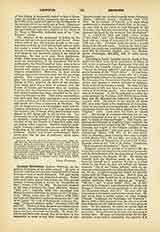

Leo Diaconus, Byzantine historian, b. at Kaloe, at the foot of Mount Tmolos, in Ionia, about the year 950; the year of his death is unknown. In his early youth he came to study at Constantinople and, as his name tells, was ordained deacon. In 986 he took part in the war against the Bulgars under the Emperor Basil II (976-1025), was present at the siege of Triaditza (Sofia), where the imperial army was defeated, and barely escaped with his life. After the year 992 he began to write a history of the empire, presumably at Constantinople. The work is incomplete. Apparently he died before he could finish it. The history, divided into ten books, covers the years from 959 to 975, that is, the reigns of Romanus II (959-963), Nicephorus Phocas (963-969) and John Zimisces (969-976). It describes the wars against the Arabs in which the fortresses of Cilicia and the Island of Cyprus were won back (964-965), the conquest of Antioch and Northern Syria from the Moslems (968-969), the Bulgarian War (969) and the defeat of the Southern Russians (971), one of the most brilliant periods of the later Empire. For the reigns of Nicephorua Phocas and John Zimisces, Leo the Deacon is the one source, the only contemporary historian, from whom all later writers have drawn their material. His authorities are his own observation and the account of eyewitnesses. He says: “The events as I saw them with my own eyes (for eyes are more trustworthy than ears, as Herodotus says) and as I gathered them from those who saw them, these things I write in my book” (Bonn edition, p. 5). Although Leo is so valuable an authority for his period, critics do not judge his manner of writing favorably. He is affected and dull, fond of foreign (Latin) words, and has a mania for unusual and extravagant forms; for simple words like “brother”, or even the verb “to be” he prefers absurd artificial synonyms. Krumbacher sums up his style as “trivial and pedantic”. Leo quotes Procopius, Homer, and especially the Bible (in the Septuagint). His loyalty to the emperor often prejudices his honesty.—His history is continued by Michael Psellus. Leo’s book was not very popular in the following centuries. Other writers who drew their information from him, were preferred, e.g. Nicephorus Bryennius. A result of this is that only one manuscript of his history is extant (cod. Paris; ‘1712).
ADRIAN FORTESCVE

